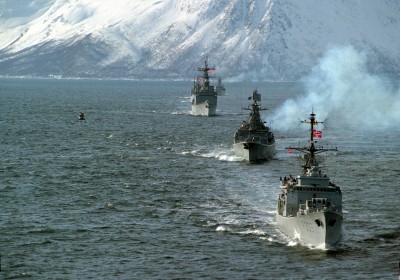In a chilling return to Cold War rhetoric, the head of Norway’s police inteligence unit PST declared on Wednesday that Russia has the intention and ability to greatly damage Norway and Norwegian interests. Islamic extremists, however, are still considered the biggest threat.

In her annual assessment of the threats facing Norway, the chief of PST (Politiets sikkerhetstjeneste) tied the security agency’s concerns about Russia to its “illegal intelligence-gathering operations.” Benedicte Bjørnland told Norwegian Broadcasting (NRK) that PST is now “more worried” than it was last year and in 2015, when Russia was also singled out as a threat to Norway.
“We don’t think there’s a danger of an invasion from Russia,” Bjørnland said at Wednesday’s press briefing on PST’s threat assessment, “but they’re doing preparatory work that can be used to seriously hurt us in another security and political situation.”
Bjørnland, who always measures her words carefully when speaking publicly, said that Russian spies are now the biggest source of concern for PST. Both the Russians “and other foreign powers” are working systematically, according to PST, to acquire information in three main areas:
*** Norway’s defense and preparedness sector including military facilities relevant for Russian security
*** political decision processes
*** critical public infrastructure, especially within the energy and communications sectors
“The most worrisome is their illegal mapping,” Bjørnland said. “In another more critical political situation, such mapping and surveying of our defense and security structure has the potential to damage our ability to defend the country.”

Asked by NRK how she thought Russian officials would react to her statements on Wednesday, Bjørnland responded that “they shouldn’t be surprised.”
PST has earlier reported that its investigators have been in contact with refugees living in Norway who have been subject to threats from Russian intelligence agents. Now PST is describing situations where Russian spies are putting pressure on private individuals and their families to gather information. Residents of Norway who have family in Russia allegedly have been especially vulnerable to pressure from Russian authorities.
“We’ve had reports from individuals and companies who believe they’ve been subjected to illegal espionage,” Bjørnland said.
Both Russian and Chinese hackers have tried to break into the computer systems of Norwegian companies with large commercial interests, along with operations that “manage fundamental national values,” PST wrote in its threat evaluation. “We have seen movements and activity that supports our belief that we have been the target of cyber attacks and attempts to recruit so-called ‘insiders,'” Bjørnland said. Such activity has existed “for years,” she said, but now it’s registered as especially negative in “an unstable world with hard fronts where illegal espionge can be used to hurt Norway.”

Nobel target
NRK reported last week that Russian agents allegedly planted so-called “fake news” in 2015 in pro-Russian news services and blogs, which in turn published a fabricated letter that would have made a Nobel Peace Prize to Ukraine’s President Petro Porosjenko look as if had been a result of heavy Ukrainian lobbying that also involved support from the US Embassy in Oslo. There were, however, no such attempts by either the Ukrainians or the Americans to persuade the Norwegian Nobel Committee to award a Peace Prize to Porosjenko, which would have been embarrassing for Russian officials.
The Russians allegedly had laid the groundwork, though, to discredit any such prize, and also had visited the Nobel Institute as part of the alleged ruse. It all prompted the Nobel Institute’s new director at the time, Olav Njølstad, to contact PST, which identified one of the Nobel Institute’s Russian visitors as a civilian employee of Russia’s intelligence agency parading as a diplomat in Oslo. PST branded the alleged charade as an attempt to influence or sabotage the awarding of a Nobel Peace Prize, while officials at the Russian Embassy in Oslo have bashed NRK’s story about it all and called it “paranoid.”
Russia under pressure, too
Russia, meanwhile, has been feeling pressured as well, complaining of spies within its borders, not least objecting to how NATO (of which Norway is a member) is establishing itself in Norway and in other member countries that share a border with Russia. Russia has expressed displeasure with the placement of US Marines in Norway on an ongoing rotation basis, calling it a “provocation,” as is Norway’s military buildup and other joint military exercises with fellow NATO members.
Norwegian defense officials and NATO itself have responded that their actions also have been a response to Russia’s “aggression” in Ukraine and not least its annexation of Crimea in 2014.
Despite all the growing concerns about Russia and Russian spying, PST still believes that Islamic extremists pose the greatest terror threat in Norway. PST’s security experts contend that it’s “as probable as improbable” that Islamist extremists will carry out a terrorist attack in Norway in 2017.
“The terror threat against European countries has never been larger than today,” Bjørnland said. “Both IS and Al Qaeda view Norway as a legitimate, but not high priority, target for a terrorist attack. New encouragement from IS and Al Qaeda to carry out attacks in the West will, however, continue to win support among followers in Norway.”
The radical Islamic milieu in Norway, however, has been weakened in the past year and now seems less likely, according to PST’s evaluation, to successfully recruit new members. Far fewer attempts are also expected to be made for Norwegian tie-ups with the terrorist group IS in Syria.
One of the worst terrorist attacks ever carried out continues to be the July 22, 2011 attacks on the Norwegian government and Labour Party, in which a lone assailant killed 77 persons. He turned out to be a young right-wing white Norwegian man who objected to both immigration and Muslims. Another young, right-wing conservative man was behind this week’s terrorist attack in Canada, when he gunned down worshippers inside a mosque in Quebec.
newsinenglish.no/Nina Berglund

